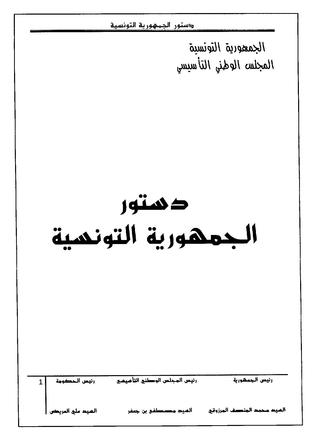Iraq is a federal parliamentary representative democratic republic. It is a multi-party system whereby the executive power is exercised by the Prime Minister of the Council of Ministers as the head of government, the President of Iraq as the head of state, and legislative power is vested in the Council of Representatives.

Impeachment is a process by which a legislative body or other legally constituted tribunal initiates charges against a public official for misconduct. It may be understood as a unique process involving both political and legal elements.

The government of Italy is that of a democratic republic, established by the Italian constitution in 1948. It consists of legislative, executive, and judicial subdivisions, as well as of a head of state, known as the president.
A constitutional amendment is a modification of the constitution of a polity, organization or other type of entity. Amendments are often interwoven into the relevant sections of an existing constitution, directly altering the text. Conversely, they can be appended to the constitution as supplemental additions, thus changing the frame of government without altering the existing text of the document.

The president of the Arab Republic of Egypt is the executive head of state of Egypt and the de facto appointer of the official head of government under the Egyptian Constitution of 2014. Under the various iterations of the Constitution of Egypt following the Egyptian Revolution of 1952, the president is also the supreme commander of the Armed Forces, and head of the executive branch of the Egyptian government.
The Law of Administration for the State of Iraq for the Transitional Period, also called the Transitional Administrative Law or TAL, was Iraq's provisional constitution following the 2003 Iraq War. It was signed on March 8, 2004 by the Iraqi Governing Council. It came into effect on June 28, 2004 following the official transfer of power from the Coalition Provisional Authority to a sovereign Iraqi government. The law remained in effect until the formation of the government in May 2006, when it was superseded by the permanent constitution that had been approved by referendum on October 15, 2005.
An entrenched clause or entrenchment clause of a constitution is a provision that makes certain amendments either more difficult or impossible to pass. Overriding an entrenched clause may require a supermajority, a referendum, or the consent of the minority party. The term eternity clause is used in a similar manner in the constitutions of Brazil, the Czech Republic, Germany, Greece, India, Iran, Italy, Morocco, Norway, and Turkey, but specifically applies to an entrenched clause that can never be overridden. However, if a constitution provides for a mechanism of its own abolition or replacement, like the German Basic Law does in Article 146, this by necessity provides a "back door" for getting rid of the "eternity clause", too.

Bahrain has had two constitutions in its modern history. The first one was promulgated in 1973, and the second one in 2002.
The Constitution of the Republic of Iraq is the fundamental law of Iraq. The first constitution came into force in 1925. The current constitution was adopted on September 18, 2005 by the Transitional National Assembly of Iraq, and confirmed by constitutional referendum, held on October 15, 2005. It was published on December 28, 2005 in the Official Gazette of Iraq, in Arabic original, and thus came into force. An official translation into English for international use was produced in cooperation between Iraqi state authorities and the United Nations' Office for Constitutional Support. Since 2006, several proposals for adoption of various constitutional amendments were initiated. The Kurdish language is official at state level.

The Supreme Constitutional Court is an independent judicial body in Egypt, located in the Cairo suburb of Maadi.

The government of Iraq is defined under the current Constitution, approved in 2005, as an Islamic, democratic, parliamentary republic. The government is composed of the executive, legislative, and judicial branches, as well as numerous independent commissions.
The Constitution of the United Arab Emirates provides a legal and political framework for the operation of the United Arab Emirates as a federation of seven emirates. The Constitution came into effect on 2 December 1971 and was permanently accepted in July 1996. Authored by Adi Bitar, a forming judge and legal advisor, the Constitution is written in 10 parts and has 152 Articles. The United Arab Emirates celebrates the formation of the Union as National Day on 2 December.

The Supreme Constitutional Court was the highest jurisdictional authority in Syria.

The Constitution of Uzbekistan was adopted on 8 December 1992 on the 11th session of the Supreme Council of Uzbekistan. It replaced the Constitution of the Republic of Uzbekistan of 1978. It is the supreme law of the Republic of Uzbekistan. The Constitution of Uzbekistan contains six parts and it is further divided into 26 chapters.
The judiciary of Iraq is a branch of the government of Iraq that interprets and applies the laws of Iraq, to ensure equal justice under law, and provides a mechanism for dispute resolution. The judiciary is composed of the Higher Judicial Council, the Supreme Court, the Court of Cassation, the Public Prosecution Department, the Judiciary Oversight Commission, the Supreme Iraqi Criminal Tribunal, the Central Criminal Court and other courts that are regulated by law.

The Tunisian Constitution of 2014 was adopted on 26 January 2014 by the Constituent Assembly elected on 23 October 2011 in the wake of Tunisia's Jasmine Revolution that overthrew President Zine El Abidine Ben Ali. It was passed on 10 February 2014, replacing the constitutional law of 16 December 2011 that temporarily formed the basis of government after the suspension of the Constitution of 1959.

The Judicial Commission of Pakistan is a national commission for appointment of the superior judiciary, consisting of the Supreme Court, the Federal Shariat Court and the High Courts, of Pakistan. The Chief Justice of Pakistan is the chairman of the commission.

The Federal Supreme Court of Ethiopia is the highest court in Ethiopia. It was established by the Federal Democratic Republic of Ethiopia constitution in 1994 and is currently located in Addis Ababa. Article 78 of the Constitution establishes the judiciary and at the top is the FSC. By the Constitution, the Federal Supreme Court has "the power of cassation over any final court decision containing a basic error of law". In 2018, Prime Minister Abiy Ahmed appointed Meaza Ashenafi to be the first female president of the Federal Supreme Court. Solomon Areda Waktolla was appointed as Vice President of the Federal Supreme Court. Both were resigned by the Parliament on 17 January 2023, and replaced by Tewodros Mihret and Abeba Embiale as Chief Justice and Deputy Chief Justice of the Supreme Court respectively.

Since the new constitution of Ethiopia enacted in 1995, Ethiopia's legal system consisted of federal law with bicameral legislature. The House of People's Representatives (HoPR) is the lower chamber of bicameral legislature of Federal Parliamentary Assembly with 547 seats and the House of Federation with 108 seats, the former vested on executive power of Prime Minister and the Council of Ministers, and the latter have authority to interpret federal law and oversees regional and federal decisions.
According to the constitution of Iraq, the Republic of Iraq is composed of federal regions, governorates, as well as local administrations. Article 117 of the constitution recognises Kurdistan Region as a federal region, and as of December 2024, it is the only federal region of the country.












